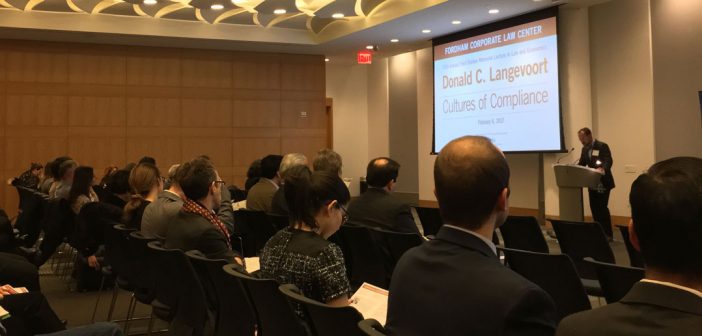On February 6, 2017, Fordham University School of Law’s Corporate Law Center, in partnership with NERA Economic Consulting, hosted its 5th Annual Fred Dunbar Memorial Lecture in Law and Economics. This year’s lecture entitled “Cultures of Compliance” was delivered by Donald C. Langevoort, Thomas Aquinas Reynolds Professor of Law at Georgetown Law. Professor Langevoort lectured on the pillars of cultivating a positive and sustainable culture of compliance in today’s corporate structure and underscored how both behavioral sciences and economics might help us better understand the issues faced by corporate compliance. Also, Professor Langevoort evaluated what a “culture of compliance” actually means in modern corporate and legal discourse.
Professor Langevoort commenced the lecture by posing a question that most likely has come to any person’s mind when reading about large corporate scandals such as Enron: “What were they thinking?” The problem, he says, is that wrongdoing is often not rational and not calculated. Thus, what is perplexing is what drives the behavior of market participants and corporate actors, and what value we should attribute to these behavioral considerations? It might matter for the market how people process information. Establishing an effective culture of compliance can be, perhaps, the most effective tool to curtail and deter behavior that leads to corporate scandals. However, that phrase is thrown around a little too loosely and it can be hard to pin down exactly what a “culture of compliance” means and how to establish the adequate one for a company.
Beliefs and cultures influence the operations, management, and practices of a company. The content of the culture is what drives company performance at different parts of the company at varying levels of intensity. Therefore, it is critical to find the proper balance in between a corporate culture that pushes the company forward and not falling prey to the slippery slope of turning a blind eye to increasingly morally questionable behavior. Finding that balance is no easy feat. The desired qualities that a company typically looks for in employees are the type that will push the company forward, such as “intensity, confidence, and risk-taking.” These same qualities, though, are often what cause employees to engage in fraudulent activity, whether or not they know the activity to be fraudulent, or at least morally questionable. For example, a recent social science experiment matched up the names of users of the infamous Ashley-Madison leak to directors of publicly traded companies. The study found that companies with a higher rate of adulterers were more likely to misreport to the Securities and Exchange Commission. Interestingly, however, a separate study found that companies with a high rate of adulterers were also more creative and innovative.
It is the temptation to simply cheat in any setting that compliance departments need to prioritize in identifying and mitigating because once an individual starts to cheat, he or she starts walking on a slippery slope. It becomes increasingly harder to scale back, and increasingly easier to justify further cheating. Successful compliance programs must go beyond solely telling employee’s not to do something wrong. Creating open channels of communication is integral to establishing a good compliance program. The message sent from the top is not always the message received at the bottom of the corporate ladder, which is why perhaps frequently, when a new corporate scandal emerges, we ask ourselves “what were they thinking?” These corporate actors would probably answer “who me? Couldn’t be. I would never do such a thing,” much the same as if you asked them who took the cookie from the cookie jar. In conclusion, the recommendation that “meaning what you say is not good enough” applies well to compliance departments and a company’s board of directors, who are entrusted and tasked with the duty to make their message heard and understood.

